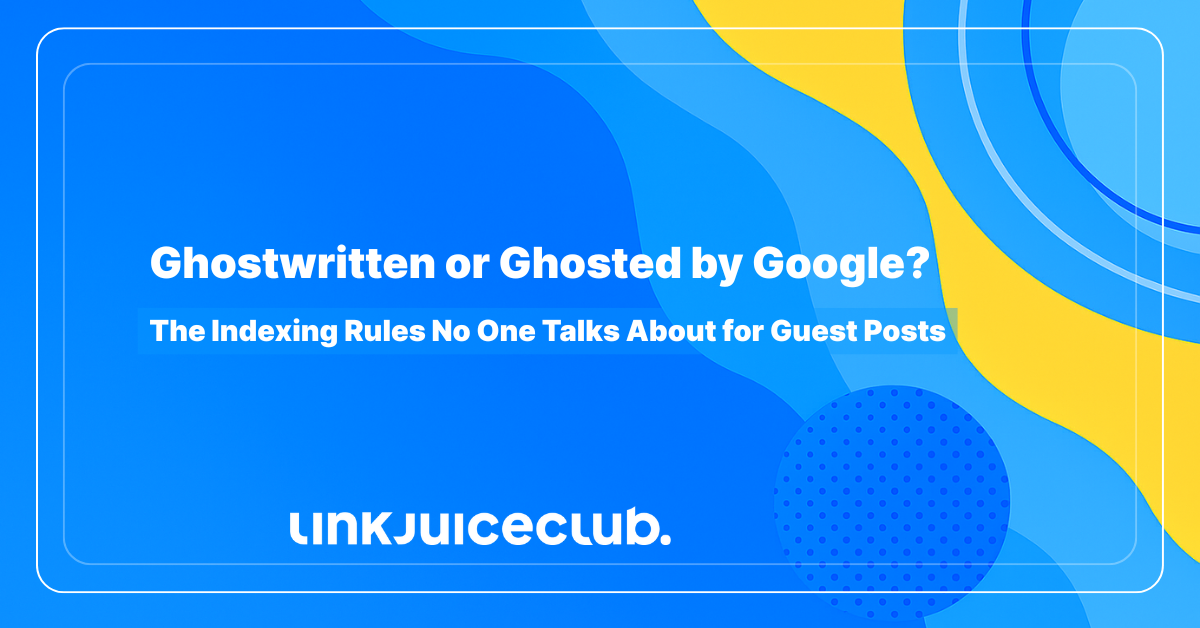
Ghostwritten or Ghosted by Google? The Indexing Rules No One Talks About for Guest Posts
They wrote the post. You published it. But then… silence. No crawl, no click, no SERP appearance. And suddenly you’re asking yourself: Did I just waste a backlink?
Welcome to the gray zone of guest post indexing rules — a place where even well-written content can vanish into the digital ether.
Think of it like this: Google’s index is a velvet-rope club, and your guest post is trying to get past the bouncer. Not every article makes the list, no matter how polished or relevant it may seem.

But here’s the twist: it’s not always about the quality of your writing. It’s about the signals, the structure, the trust… and knowing which invisible rules you’re unknowingly breaking.
You might have great content, but it’s the behind‑the‑scenes guest post indexing rules that make all the difference.
Why Guest Posting Still Holds Power in 2025
Guest posts aren’t relics—they’re strategic tools. Google may have evolved, but guest contributions still matter:
- 🚀 Authority from Trusted Sites: Posting on reputable blogs boosts credibility and referral traffic.
- 🔁 Fresh Signals to Google: Google loves new content—especially content with solid context and backlinks.
- ✍️ Contextual Links That Click: Not all backlinks are born equal. Relevant, in-body links still pack weight.
💣 Pro Tip: Anchor your link with clear, relevant text—not just “click here.” It helps both users and Google understand why the link matters.
Common Mistakes That Keep Guest Posts Invisible
Guest articles can vanish from Google for reasons you might never see coming:
- No-follow everywhere: If host pages default to no-follow on all outbound links, Google might skip crawling or assigning value.
- Hidden mirror content: Duplicate articles across blogs are red flags for indexing algorithms.
- Weak site authority: A post on a low-quality or spammy host won’t help your link—and might not get crawled.
- Poor internal linking: Google won’t index deep content unless it’s connected within the host’s site.
Spot at least one of these blockers? That article is likely trapped in crawl limbo.
The Step-by-Step Indexing Playbook (Guest‑Post‑Style)
Here’s your method: a simple, repeatable process to get Google to notice—and index—your guest content.
1. Vet the Host Blog Smartly
- Check DA/PA, organic traffic, relevance to your niche.
- Spot red flags: spammy posts, hidden links, or scraped content.
2. Craft SEO-Clean Copy
- Unique content, no duplicate dumps.
- Include at least 300‑500 words of original intro or context around your core content.
3. Optimize Anchor & Link Structure
- Use clear, context-rich anchor text.
- Limit to 1–2 relevant links per guest post.
- Verify outbound links aren’t automatically no‑follow.
4. Push for Internal SEO from Host
- Ask to have your post linked from 1–2 internal pages.
- Ensure it’s added to the main navigation, category pages, or sidebar.
5. Trigger Google Awareness
- Post the article during a crawl-friendly period (e.g. midday GMT).
- Use Google Search Console’s URL Inspection & Submit tool if you can.
- Share on social or mention to platform admins to encourage early crawl signals.
Staying Indexed Isn’t Luck — It’s Maintenance
Getting indexed is just the start. Staying indexed? That’s where the pros separate from the amateurs.
If you’re not actively managing your links, your guest post could quietly slip off Google’s radar. These ongoing strategies help lock in your visibility and reinforce your alignment with guest post indexing rules:
- 🔍 Audit Your Links Like a Ritual:
Use tools like Ahrefs, Semrush, or Screaming Frog to spot broken backlinks, sudden “nofollow” changes, or host site declines. If the foundation weakens, your index position could crumble. - 🧠 Refresh, Don’t Rot:
Keep your guest posts alive by requesting minor updates — internal links, stats, or topical tweaks. A living post signals relevance, which aligns with how Google interprets guest post indexing rules over time. - 📊 Monitor Indexing Signals Weekly:
In Google Search Console, track impressions, crawl status, and any “Discovered – currently not indexed” warnings. Those quiet alerts are early signs your content needs attention.
Quick Reference Table: Indexing Signals You Can Control
| Factor | Why It Matters |
| Domain quality of host | Signals to Google the reliability of the source |
| Internal links to the post | Helps Google discover and navigate new content |
| Link attributes (rel/follow) | Affects crawl pass-through and indexing weight |
| Post uniqueness | Prevents filters or penalties tied to duplicate content |
| Sharing / external signals | Builds new crawl triggers and contextual relevance |
Here’s Where the Poetic Twist Aligns with SEO Strategy
Your guest post isn’t just another blog entry — it’s a strategic signal, coded with meaning and meant to be discovered. When done right, it acts as a beacon, subtly guiding Google through relevance, trust, and authority — back to your site.
But here’s where most creators slip:
They assume compelling writing speaks loud enough on its own.
That’s the myth. The truth? Google doesn’t just reward prose — it rewards precision.
Follow the guest post indexing rules and suddenly, your article becomes more than content. It becomes infrastructure — a fully optimized asset that draws attention through structured value.
When structure, trust, and technical hygiene come together, that’s when Google notices.
That’s when indexing happens not by accident, but by design.
Key Takeaways: Getting Guest Posts Indexed the Right Way
Let’s bring it all home. Guest posting still works — but only if you follow the rules Google actually pays attention to. These aren’t guesses; they’re strategic moves built around proven guest post indexing rules.
Here’s what you need to remember:
- Relevance, quality, and authority of the host site shape your indexing odds more than just the link itself.
- Structure matters — proper internal linking, crawlable formats, and clean follow attributes give your content legs.
- Ongoing audits and updates are essential to staying visible. Indexing isn’t a one-and-done — it’s a process.
If you treat every post like a one-time win, you’ll miss the compounding value of a well-indexed guest network. But follow guest post indexing rules consistently, and you’re building a brand that Google can’t ignore.
Think like an editor, act like an engineer, and write like someone who knows how search engines really think.
Master the guest post indexing rules, and your content won’t just be seen — it’ll stick.





